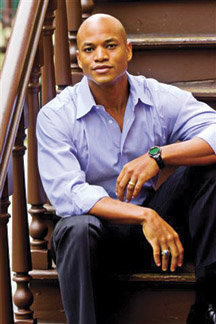Right now, a Jersey City resident named Wes Moore has a successful job working at Citigroup in their global markets division. He has been a Rhodes Scholar, a captain in the U.S. Army, a White House Fellow, and has spoken at the Democratic National Convention in Denver. He is also the author of a new book, “The Other Wes Moore” (Spiegel and Grau, April, 2010) that debuted on the New York Times Bestseller List last month at number 5 for nonfiction.
The “other” Wes Moore, as referred to in the title, is serving a life sentence without parole at the Jessup Correctional Institution in central Maryland in connection with the 2000 murder of an off-duty Baltimore police officer.
“After he finished reading, he told me how impressed he was by how I got the facts right.” – Wes Moore
________
Moore, 31, explores this in his first book, as well as the convergence of their paths and the realization of how both men could have had the other’s life.
“The chilling truth is that Wes’s story could have been mine; the tragedy is that my story could have been his,” Moore writes in the epilogue of the book.
Moore in an interview last week said he was “thankful” that the book has resonated not just with African-Americans or even with people who had upbringings similar to his and the other Wes.
“I am thankful that people who are reading the book understand the point to the book,” said Moore, “that this book is about much more than two kids, that it is much more than one neighborhood; it is about all of us.”
Moore continued, “It is the choices we make in our lives, and the people who help us make those choices.”
Moore is on a book tour that takes him this week to Atlanta, Los Angeles, and San Francisco. When he is not traveling, he lives with his wife Dawn at their home in the Port Liberte community on the Jersey City waterfront.
Seeing himself in the other
Moore first encountered the other Wes in 2000. It was in an edition of his hometown Baltimore Sun newspaper where there was a short article about himself – then a graduate of the local institution, Johns Hopkins University – being named a Rhodes Scholar, a prestigious, international award given to those who pursue postgraduate studies at the University of Oxford in England.
The newspaper was also running an article about the death of Bruce Prothero, an off-duty Baltimore police officer who was killed while trying to stop some robbers of the jewelry store where he worked, and about the four men who responsible for his death.
One of them was also named Wes Moore.
After earning a Rhodes Scholarship, the author Wes Moore went on to Oxford, where he earned a degree in international relations. Yet the story of his “doppelganger” never left him.
“Two years after I returned from Oxford, I was still thinking about the story. I couldn’t let it go,” Moore writes in the book. “If you’d asked me why, I couldn’t have told you exactly.”
Whatever the reason, Moore started a correspondence with the other Moore, and learned a lot about him that suggested some eerie parallels.
Eerie parallels
Both lost their fathers at early ages. Wes the writer saw his father collapse in front of him, while Wes the prisoner hardly saw his father at all. Both also moved around with their families, whether in different areas of one town or to different cities. And both began to get into trouble at an early age.
But the author Moore found salvation after his mother enrolled him in a Pennsylvania military school, which began him on the path that he continues to take. The other Moore never had that fortune, and drifted into a life of crime.
So what did the prisoner Moore think of the book about their similar, yet radically different existences?
“After he finished reading, he told me how impressed he was by how I got the facts right,”
Moore said. “The other reaction he had, after reading the book, was he was amazed at how little he has done with his life – which was tough to hear.”
To learn more about the book, http: the otherwesmoore.com.
Ricardo Kaulessar can be reached at rkaulessar@hudsonreporter.com.
